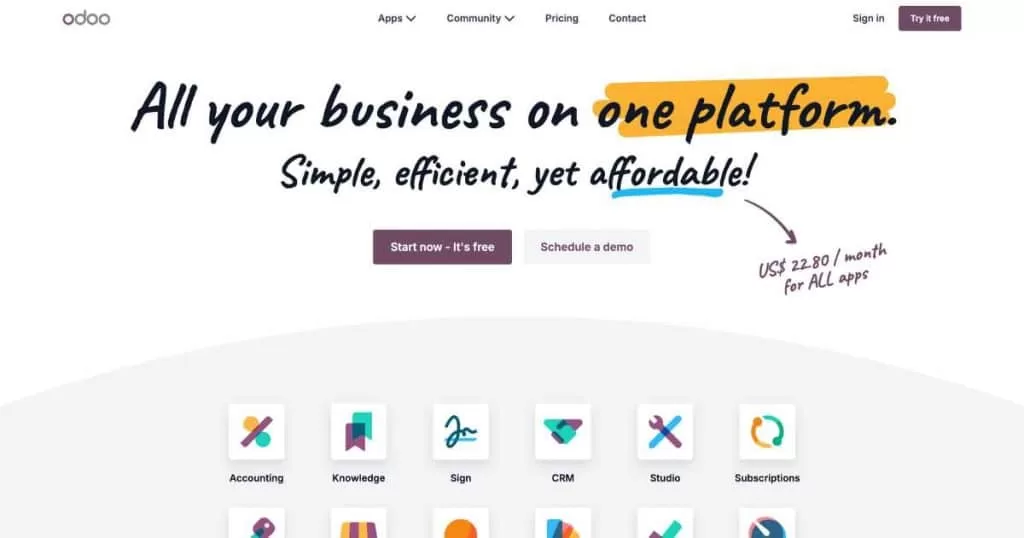Enterprise Resource Planning (ERP) is a software solution that helps businesses manage their daily operations, including finances, inventory, human resources, ecommerce, supply chain and customer relationship management. ERP systems benefit micro businesses, as they help streamline operational processes and improve their overall efficiency.
Odoo is an open-source all-in-one ERP solution that is designed specifically for small businesses. It offers a wide range of modules that make it an ideal choice for small scale businesses looking for budget effective automation software that improves their operations. Let’s explore how odoo for small businesses is best!

Understanding Odoo For Small Businesses
Odoo is a stop solution business management software offering various modules supporting sales, purchase orders, website creation, social marketing, accounting, finance, inventory, customer relationship management, and more. It is an easy-to-use and adaptable cloud-based ERP, allowing users to digitalize their business operations easily without the need of technical knowledge. The best thing about Odoo is that it is not bound for any specific niche, Odoo is for everyone!
Contrary to other ERP solutions, Odoo offers more affordability and offers a range of features designed specifically for micro-enterprises. You can start with one or multiple dependent Odoo apps according to your needs for free.
Odoo installation is swift, budget-friendly, and supported by a reputable Odoo-certified expert network. Odoo has provided a lot of learning material on the Internet so you can also learn this open-source app quickly as a small enterprise.
Preparing for Odoo ERP Implementation
Odoo offers a variety of tools and before installing Odoo, it is important to pen down your business requirements and goals. This will save you from confusion of what to choose and clearly determine which features of Odoo are most important for your business.
Keep the following steps in mind to ensure a successful deployment:
1. Define Business Requirements, Goals, & Budget
Defining the business requirements and goals of your business and marking out your operational needs is the most crucial step of setting up Odoo.
Microscale businesses should conduct an extensive review of their current processes and recognize pain points, inefficiencies, and potential areas for improvement. This involves engaging an all-board key stakeholders meeting across different departments to gather detailed insights and understand their needs.
This assessment covers long-run goals, expandability, and the organization’s overall strategic planning. Clearly articulate your business requirements and goals. Are you planning to organize inventory management, mechanize financial processes, or tend to enhance customer management?
Objective definition and setting budget limits and resources will guide the implementation of Odoo for your business.
2. Regulate Business Process Analysis & Decide on Collaboration
A detailed business progress analysis is essential. This involves mapping out current workflows, understanding complexities between different processes, and identifying grounds where Odoo can bring significant value.
This analysis requires involving end-users, as it is crucial to gain a practical understanding of day-to-day operations. The goal here is to align Odoo’s capabilities with the business’s specific requirements, ensuring a customized and productive implementation.
Collaborating with a certified Odoo Partner provides several practical advantages over own implementations, including expert consultancy, best practices, time efficiency and access to specialized guidance. Odoo Partners can assist in providing uniquely tailored Odoo solutions to your specific business needs and ensure a smoother customization and implementation process.
3. Creating a Project Plan & Timeline
The project plan should trace out the key milestones, tasks, and responsibilities associated with the Odoo set up. It’s essential to set a realistic timetable, considering potential complexities and keeping a room for flexibility.
The project plan should involve key stakeholders, including representatives from all departments and IT personnel. A robust communication strategy is a must-have to inform all stakeholders about progress and potential changes. Periodic updates, training and instruction sessions, and interactive feedback are necessary to ensure a polished transition to Odoo implementation.
To properly support the implementation process, it is also beneficial to allocate enough resources, both in terms of people and assets.

Benefits of Odoo for Small Businesses
1. Improved Efficiency and Productivity:
- Odoo streamlines business processes by integrating various functions into a single platform. Whether managing sales orders, tracking inventory, or handling payroll, Odoo reduces manual effort and minimizes data duplication. Employees can focus on value-added tasks rather than repetitive administrative work.
- Automation features, such as workflow approvals and scheduled tasks, enhance efficiency. For example, mechanize invoice generation and reminders to ensure timely payments.
2. Enhanced data accuracy and decision-making:
- Odoo centralizes data, ensuring consistency and accuracy. Discrepancies or conflicting records are less likely when information is stored in one place.
- Real-time reporting and analytics provide insights into business performance. Managers can make informed decisions based on up-to-date data. Whether tracking sales trends, monitoring inventory levels, or analyzing customer behavior, Odoo’s reporting capabilities empower better decision-making.
3. Cost Savings and Resource Optimization:
- Reduced IT Costs: Odoo’s open-source nature eliminates hefty licensing fees. Microenterprises can access robust ERP features without breaking the bank.
- Efficient Resource Allocation: Odoo helps allocate resources effectively. Whether managing human resources, optimizing inventory levels, or scheduling production, Odoo ensures that resources (including time, money, and workforce) are used efficiently.
- Lower operational costs: automation reduces manual labour, minimizing operational costs. For instance, automated order processing reduces order fulfillment time, saving costs.
4. Scalability and Flexibility:
- Odoo grows with your business. As your microenterprise expands, you can add or customize new modules. Whether you’re opening new branches, launching new products, or entering new markets, Odoo adapts to your changing needs.
- Customization options allow you to tailor Odoo to your specific industry requirements. Whether you’re in retail, manufacturing, services, or e-commerce, Odoo can be configured to match your business context.
5. Improved Customer Experience:
- Odoo’s integrated CRM (Customer Relationship Management) module helps manage customer interactions. From lead management to post-sales support, Odoo ensures a seamless customer experience.
- Features like automated follow-ups, personalized communication, and order tracking enhance customer satisfaction. Happy customers lead to repeat business and positive word-of-mouth.
Odoo ERP empowers micro businesses to operate efficiently, make smart decisions, and always have a competitive edge to stay competitive in a dynamic market. Unlock the powers of Odoo by discovering What’s new in Odoo 18.
Common Challenges and Solutions Regarding Implementations of Odoo For Small Businesses
Here are some potential challenges that microbusinesses might face during Odoo implementation because the attempt to shift all of your daily operations on your own is risky and could result in numerous problems, but don’t worry we have proposed their intended solutions too:

- Lacking ERP implementation knowledge. Without a clear-cut Odoo implementation guidance, businesses may not be able to unlock their productivity up to full potential. To overcome this challenge, businesses should devise a clear implementation plan that defines what to do, how to do and when to do it. This plan should be tracked by every personnel responsible in the implementation process.
- Commonly there are issues and concerns from the executives which result in getting half or even no executive buy-in. The top management should be fully convinced to show their commitment to the project’s success to make the implementation swift and successful. In order to overcome this problem, the top executives should be made aware of the advantages of deploying Odoo. A detailed presentation demonstrating the profitable benefits of using Odoo ERP software can help get all-in executive buy-in.
- Not receiving end-user support: Businesses may fail to receive strong support for implementing the Odoo ERP modularity. Businesses should create separate detailed training modules for the it’s end-users to overcome this gap. The user interface of the Odoo ERP system should be simple and easy to navigate without compromising on the intended core functionalities.
- Having no technical support: Businesses commonly need more technical expertise and resources to support Odoo implementation and post-implementation phases. To overcome this challenge, businesses can team up with an Odoo ERP implementation company that can provide technical as well as strategic support during the implementation phases and beyond.

In conclusion, Odoo is an ideal ERP to digitalize small businesses and multiply their operational performance. It is always recommended to contact Odoo certified partners for more benefits on Odoo for small businesses so that they can successfully implement Odoo and enjoy its benefits with cost and time effectiveness.
Reach out to HSxTech for Expert Odoo Implementation for your Business!


Enterprise Software: The Backbone of Modern Business Explained – FreeBizNetwork
October 28, 2024[…] allows organizations to optimize their operations and achieve strategic goals. Whether you’re a small business looking to scale or a large corporation aiming to maintain a competitive edge, investing in robust enterprise software […]
Transform Your Business Communication Using Odoo VoIP | HSxTech
November 7, 2024[…] to view call volumes and performance metrics. For this reason, transparency is one area that small businesses on Odoo can take a step forward on for service […]